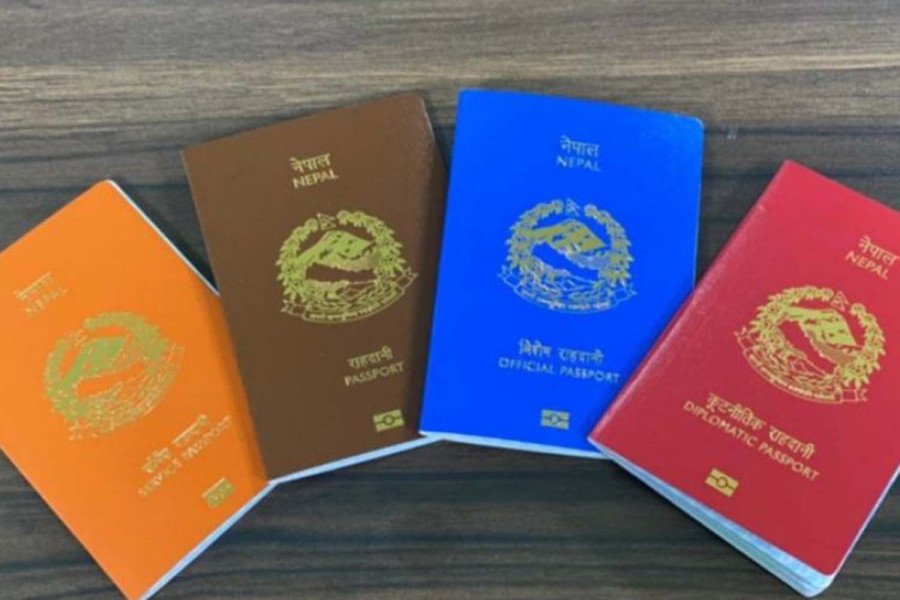National
Dropped from bid, IDEMIA faults passport process
French firm claims panel’s review favoured German bidders in multi-billion-rupee deal.
Anil Giri
IDEMIA Smart Identity, which was unsuccessful in the recent e-passport bid, filed a complaint at the Department of Passports (DOP) on Thursday against its decision to award letters of intent (LoI) to two German firms for passport printing and supply.
The DOP on June 6 issued LoIs to Veridos GmbH and Muehlbauer ID Service Gmbh awarding the two contract packages. IDEMIA Smart Identity, which has been providing passports to Nepal since 2010, was left out of the race.
“IDEMIA Smart Identity is convinced that the intention to award these contracts to the selected companies is unrightfully due to critical administrative and technical non-compliance,” the company said in an email to the Post from Paris. “Accordingly, on June 12, 2025, IDEMIA Smart Identity has formally submitted a request for a review of the decision through the appropriate legal channels, in accordance with Nepalese procurement law.”
Out of two separate packages, the LoI for the first package 1, covering the execution of the eMRTDS system, including pre-enrolment, enrolment, data management and delivery system was awarded to Muehlbauer ID Service GmbH at a price of Rs1,550,814,325.81 ($11,154,834.41) plus Rs738, 536.20). The second package, covering the production of ePassports, including personalisation, quality control, and packaging was awarded to Veridos GmbH at a price of Rs6,113,827,370.14 equivalent to 41,029,978.53 euros plus Rs 161, 608,384.79.
The French company had competed for both packages but was excluded from the bidding process.
IDEMIA submitted its bids for both packages on February 21, 2025. On June 5, 2025, the company was informed by the DOP that Package I had been awarded to Muehlbauer ID Services GmbH, and Package II to Veridos GmbH, the email to the Post said.
As per Nepal’s procurement law, government contracts for construction, procurement, supply, and other public projects are awarded to the lowest bidder. However, if a bidder believes the evaluation process was flawed or finds discrepancies, it can register its complaint within seven days. If the explanation from the relevant authority is unsatisfactory, the complainant can submit an application with the Public Procurement Review Committee (PPRC), a semi-judicial body under the Public Procurement Monitoring Office (PPMO).
A technical committee led by Tirtha Raj Aryal, director general at the Department of Passports was formed to review the technical and financial proposals. Over two dozen officials from different government agencies and entities and those with information technology background were members of the evaluation committee. Aryal confirmed his office has received a complaint from IDEMIA.
“After not being satisfied with our review, IDEMIA has filed a complaint. We will look into the complaint. The technical committee will look into the issues raised. If IDEMIA’s claims are not justified, we will proceed accordingly. But if the company’s claims prove valid, we will consider a different course of action,” said Aryal. The complaint is confidential and cannot be disclosed, he added.
Sources told the Post that the winning bidders failed to submit a list of several technical items required by the tender documents, or submitted secondary technical items rather than those specified. During the evaluation process, there were also allegations that members of the tender evaluation committee were pressured to change their report and recommendation to favour certain companies.
On November 28, 2024, the passport department had issued an international electronic tender notice for the procurement of new e-passports. Foreign Minister Arzu Rana Deuba said during a meeting at a meeting of International Relations and Tourism on Friday that the bids received within the deadline had been evaluated as per regulations, and letters of intent had already been issued.
She added that an agreement regarding the supply of new passports and related systems is expected to be signed within the next 20-25 days.
“IDEMIA Smart Identity points out that the financial bids submitted by all competing parties were unprecedentedly close. IDEMIA Smart Identity emphasises that depending on the exchange rate used to convert the financial bids into Nepalese rupees (NPR), the Government of Nepal could achieve significant cost savings by selecting IDEMIA Smart Identity's bid,” IDEMIA said in its email.
“We remain committed to transparency, fair competition, and delivering secure identity solutions that meet the highest international standards,” the IDEMIA email to the Post stated.
A local representative of a rival bidder told the Post that complaints had previously been raised against the technical committee for forcing changes to the evaluation committee’s recommendations, but those concerns were ignored.
Since 2010, after Nepal switched to machine-readable passports from hand-written ones, IDEMIA has been providing both MRP as well as e-passports or biometric passports. The biometric passport was introduced in 2022. Since then, IDEMIA has printed and supplied over 10.53 million passports to the DOP.
Five international security printing companies had submitted bids for Nepal’s multi billion-rupee passport contract. The winning bidder should supply 6.4 million passports over five years.
“As the longstanding provider of Nepal's passports for over 15 years, IDEMIA Smart Identity brings unmatched experience and deep expertise in secure identity solutions and services, as well as the local environment,” the IDEMIA email said, adding, “Our proven track record and in-depth understanding of the country's systems position us as the most qualified partner to support Nepal in maintaining the highest quality in its ePassport program.”




 9.83°C Kathmandu
9.83°C Kathmandu














